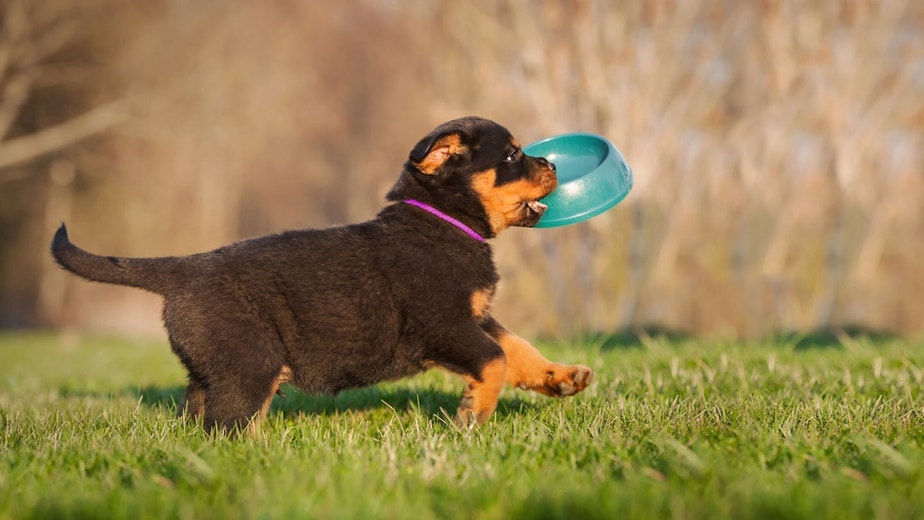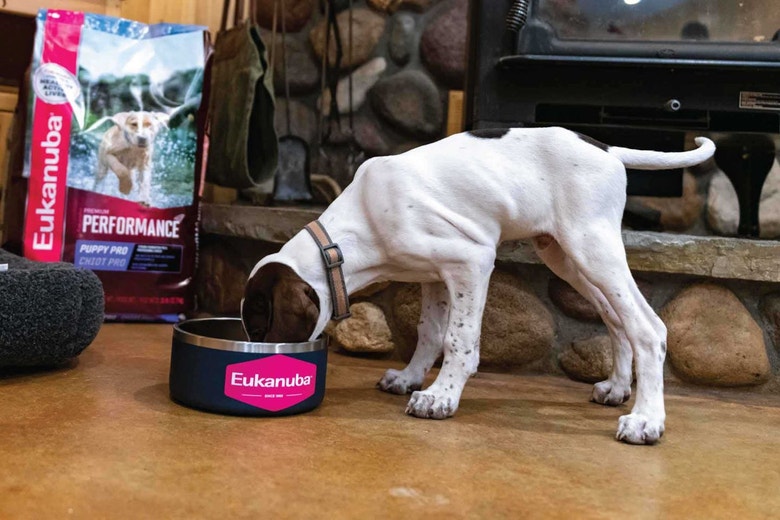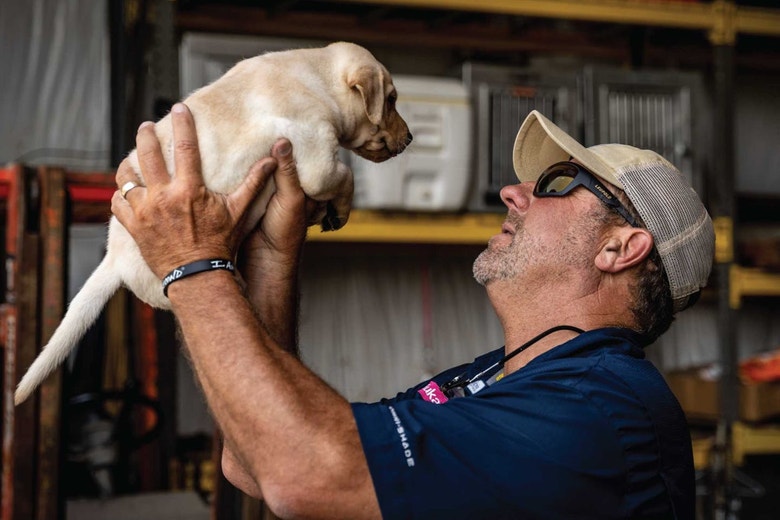
A guide to socialising your puppy
Socialisation is a crucial step in your puppy’s long-term development.
A properly socialised puppy has learned to be well-behaved around other animals and humans while possessing enough confidence to feel comfortable in various situations and environments. By starting the process early, you’ll get your puppy off to the best possible start. Even better, you’ll help prevent a range of behavioral problems later in life.
WHY IS PUPPY SOCIALISATION IMPORTANT?
The more exposure your puppy receives to a diverse range of environments, people, smells, and animals, the more comfortable they’ll feel in the wider world. Thoroughly socialised puppies usually grow up to become well-adjusted, confident, relaxed dogs, with a knack for rapidly adapting to different social environments.
On the other hand, puppies experiencing fewer social interactions with other dogs during early life aren’t nearly so lucky. Their lack of key socialisation skills can often lead to negative behavioral traits – including nervousness, aggression, or separation anxiety.
An unsocialised or poorly socialized puppy is also far more limited in what they can do, which in turn restricts what you can do with them and where they can go with you. That’s why teaching your puppy to socialize with other people, animals, and environments may be the most important time you’ll ever spend together.
WHEN IS THE BEST TIME TO START SOCIALISING A PUPPY?
Puppies have what’s called a ‘critical socialisation’ period during their first three months of life when they’re extremely impressionable. A puppy’s experiences during this crucial period of learning and development shape their behavior well into adulthood, making this the most important time in the entire socialising process.
By providing plentiful opportunities for socialisation along with exposure to various environments, you’ll help your puppy steadily grow into a well-adjusted adult who relates positively and openly to other dogs, people, and environments.
Steps To Properly Socialise Your Puppy
When beginning the whole process, it’s important to start small.
First, introduce your puppy to new faces, sights, and smells. It’s a great idea to partake in these varied experiences with them as well because you’ll help them gain confidence while learning how to behave in specific situations.
Staying fully aware of your actions while you’re training is essential because it’s the best way of keeping track of whether you’re sending the right signals. Remember the golden rule of socialisation: Encourage curiosity.
Whenever your puppy’s actively exploring a new environment with confidence, it’s important to respond equally positively. Providing ample verbal praise and encouragement will teach your puppy to be curious and open-minded about new experiences, as well as encourage this behavior in future.
Here are several tips to help keep your puppy well-adjusted in early and later life.
1: Take Your Puppy For Daily Walks
Daily walks are fundamental for helping your puppy grow comfortable with its surroundings while becoming conditioned to potentially unnerving noises from the outside world.
A common misconception is that puppies have an innate ability to walk on a leash beside you without training. Unfortunately, this isn’t true!
So, it’s important to train your puppy to walk on a leash calmly beside you without expecting too much of them initially. We also suggest taking your puppy outside to sniff and explore (on-leash) during their training, which will help them grow accustomed to their new world.
2: Invite your Friends Over
It’s important to expose your puppy to as many new faces as possible early on because you’ll acclimate them to being around strangers without showing signs of nervousness or fear. Your puppy will learn to spread their affection around, rather than reserving their love for their owner while growing wary of anyone else entering their space.
3: ATTEND Puppy School
Puppy school is a twofold system. It not only helps potentially unruly puppies blossom into confident, sociable, and well-rounded dogs but also enables owners to improve their own relationships with their puppies.
You’ll also be giving your puppy the best possible start in life by offering the opportunity to socialize with other dogs and people in a safe and controlled environment. Enrolling in puppy school will therefore assist your puppy’s early socialization while shaping their behavior into adulthood.
Puppy Socialisation Checklist
Creating a checklist of experiences, people, and surroundings your puppy should be exposed to throughout their life will allow you to make sure your puppy feels comfortable in normal day-to-day scenarios. By creating a comprehensive checklist of experiences, people, and surroundings your puppy should be exposed to throughout life, you'll help your puppy feel comfortable in normal day-to-day scenarios.
Below is a list of prime opportunities to expose your puppy to throughout their life:
People & Animals
Adults: both females and males to make sure your puppy takes a liking to both
Children
Strangers
Dogs
Other people’s homes
Other animals/household pets
Surroundings
Vet Clinics
Parks
Ponds and riverbanks
Experiences
Different surfaces (grass, stairs, mud, sand, carpet etc…)
Road trips in the car
Bath times
Loud noises (vacuums, microwave, hairdryer, music, cars, storms etc…)
Grooming
Leash Training
Crate Training
Swimming
Handling
Enrichment Toys
Chasing Tennis Balls
Can I Take My Puppy Outside Before VaccinatIONS?
Before exploring the best age for puppies to start going outside, it’s important to bust some myths. One common misconception is that puppies should be kept inside until they’ve had their 12-week booster shot. In fact, puppies are strongly encouraged to venture outside to expose themselves to as many new surroundings, sights, smells, noises, and other sensations as possible.
Because puppies are more susceptible to diseases during this time, it’s important to remain safe and sensible when deciding where to take them. As a general rule, we recommend staying away from dog parks until they’re fully vaccinated. (These are often just too frantic for beginners, and it’s also impossible to know whether all the other dogs are vaccinated.)
Where are some safe places to take my unvaccinated puppy?
While it’s not recommended to take your unvaccinated puppy to dog parks in the early stages due to the risk of infection, there are plenty of other options to enjoy some outside time when they’re still very young.
If you’re seeking some safe places to take your unvaccinated puppy, consider:
A friend’s house (provided they don’t have dogs or cats)
Going shopping (if close by)
Around your block
Around your own (or a friend’s) backyard.
When is it safe to introduce my puppy to other dogs?
There’s no single best way to socialize a puppy, but we do have some useful hints.
While it’s not recommended to introduce your puppy to other dogs from the very first stages of life, don’t worry – you won’t have to wait long.
Can my unvaccinated puppy be introduced to vaccinated dogs?
Even before they’re old enough to be vaccinated, it’s still possible (and even desirable) for your puppy to interact with other dogs. However, you still have to be careful when doing this, because you have to know which dogs are ‘safe’ for your puppy to mingle with.
A ‘safe’ dog must be fully vaccinated, and it can’t come into contact with other dogs that might not be vaccinated. (As long as you take these precautions, you can do this from the very beginning.)
How can I make sure my puppy doesn’t get overwhelmed?
To avoid overwhelming your puppy with stimulation, avoid taking things too fast, too soon. Even though your puppy can be around other dogs in exactly the right circumstances, it’s best to keep their playtime to a one-on-one basis at first. Don’t worry – you’ll have plenty of opportunities to ramp it up very soon!
How do I introduce my puppy to other dogs?
In a word, slowly.
Remember, this is a time where your puppy’s busy learning all the skills that will see them right through to adulthood. If they have a bad experience at this early stage, they may become more apprehensive about exploring and socializing in future.
Start with a one-on-one playdate. Instead of putting both dogs in a room and expecting everything to go perfectly, cautiously introduce them to avoid overwhelming your puppy. You should start with both dogs on leashes, which can then be carefully removed after your puppy shows they’re comfortable with the other dog. Then, simply let them sniff and get to know each other without giving directions, which will teach your puppy to stay calm in this strange new situation. There’s plenty of time for rough and tumble later!
Once your puppy has become comfortable with one friend, try introducing them to another ‘safe dog’ at a different location, preferably somewhere they’ve been before. When they’re fully settled in with each new dog – and you’re feeling brave – you can try getting all three together for a run around the backyard. Be warned, though – things are likely to get pretty frantic! (They’re dogs, after all!)
Doing things in stages like this is a great way to prepare your puppy for more crowded and energetic social events in future. If your puppy doesn’t seem that comfortable with the two other safe dogs, go back to playing with one dog rather than expecting them to adjust right away. You can repeat the experiment as soon as your puppy seems ready to give it another try.
How to socialise a puppy at home
If you’re unable to socialize your puppy outside of your home, or still feel slightly cautious, you’ll be pleased to know there’s still plenty you can do without even leaving your house. If this sounds like you, focus on home-based tasks to build your puppy’s confidence. For example, it’s helpful introducing your puppy to common household items such as cardboard, carpets, rugs, plastic, and grass, as well as new noises, surroundings, and textures … anything at all that will provide unique learning experiences.
Remain calm during every stage of the training, especially when it comes to socialization. Whether you’re rewarding your puppy for taught behavior or simply encouraging positive interaction, verbal praise (accompanied by a favorite treat or two) will reinforce this behavior while creating a more enjoyable overall experience for your puppy.
Finally, go easy on yourself! Even if it seems difficult at first, your efforts will help your puppy grow into a brave, confident, and inquisitive dog.



